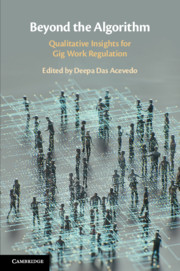Book contents
- Beyond the Algorithm
- Beyond the Algorithm
- Copyright page
- Contents
- Figures
- Tables
- Foreword
- Acknowledgments
- Introduction
- 1 The Rise and Scope of Gig Work Regulation
- 2 An Uber Ambivalence
- 3 Invisible Work, Visible Workers
- 4 The Importance of Qualitative Research Approaches to Gig Economy Taxation
- 5 Just a Gig?
- 6 Algorithmic Management, Employment, and the Self in Gig Work
- 7 Regulating Transportation Systems without Authority (or Data)
- 8 Words Matter
- 9 Rewriting the Rules
- 10 What Regulators Could Gain by Listening to Rideshare Drivers
- Index
- References
5 - Just a Gig?
Sharing Economy Work and the Implications for Career Trajectory
Published online by Cambridge University Press: 22 October 2020
- Beyond the Algorithm
- Beyond the Algorithm
- Copyright page
- Contents
- Figures
- Tables
- Foreword
- Acknowledgments
- Introduction
- 1 The Rise and Scope of Gig Work Regulation
- 2 An Uber Ambivalence
- 3 Invisible Work, Visible Workers
- 4 The Importance of Qualitative Research Approaches to Gig Economy Taxation
- 5 Just a Gig?
- 6 Algorithmic Management, Employment, and the Self in Gig Work
- 7 Regulating Transportation Systems without Authority (or Data)
- 8 Words Matter
- 9 Rewriting the Rules
- 10 What Regulators Could Gain by Listening to Rideshare Drivers
- Index
- References
Summary
While gig-based work is marketed by platforms as an attractive opportunity, little attention has been paid to the long-term experience of gig workers. Based on longitudinal interviews with 11 gig workers, this chapter seeks to answer the question, what is the impact of gig economy work on a worker’s future career trajectory and personal life? To paraphrase Kalleberg (2011), is gig-based work a good or bad job? What distinguishes those workers who move out of gig work from those workers who remain engaged in gig work, whether by choice or circumstance? Do workers think that extensive time spent in gig work as a primary source of income has affected their ability to move to stable traditional employment? This chapter connects gig work to a larger discussion of “side hustles” and worker reliance on additional sources of income, and the impact of underemployment on wages and employment call-backs. The negative career implications of gig work, especially long-term gig work, suggest serious inequities in regards to worker opportunity or experience. These inequities should be cause for concern among labor and employment law scholars, and further support the importance of establishing a social safety net and workplace protections for gig workers.
Keywords
- Type
- Chapter
- Information
- Beyond the AlgorithmQualitative Insights for Gig Work Regulation, pp. 103 - 122Publisher: Cambridge University PressPrint publication year: 2020
References
- 2
- Cited by

